By 2050 about one in every four persons in the UNECE region will be over the age of 65. Population ageing affects almost all aspects of society. The transformative change required to adapt societies to the implications of population ageing and individual longevity cannot be achieved without a whole-of-government and whole-of-society effort. For this reason, mainstreaming ageing - that is the systematic integration of ageing issues across all relevant policy fields and at all policy levels - was recommended by the Madrid International Plan of Action on Ageing (MIPAA) and included as a commitment in the UNECE Regional Implementation Strategy for MIPAA.
UNECE supports member States in developing national mainstreaming strategies through technical guidance, the exchange of good practices and tailor-made Road Maps for Mainstreaming Ageing.
Guidelines

Mainstreaming ageing is a strategy, process and multi-dimensional effort of integrating ageing issues into all policy fields and all policy levels. The Guidelines for Mainstreaming Ageing provide policymakers with suggestions on how to advance or improve their mainstreaming efforts, considering ageing both from a societal and individual life-course perspective. They draw on the methodology of UNECE Road Maps for Mainstreaming Ageing and country experiences gained over close to 20 years of implementing the Madrid International Plan of Action on Ageing in the UNECE region.
Executive Summary (ENG) - (GER*) - (PRT*)
Download publication (ENG) - (GER*) - (PRT*) - (TUR*)
(*) Unofficial translations
Online Course

Based on the Guidelines for Mainstreaming Ageing, this interactive course introduces the five stages for developing a strategic framework to mainstream ageing. Guided by the fictional moderator Patricia and her friend James, the course first introduces the concept of mainstreaming ageing and explains how to get started. It then covers the objectives and content of conducting a situation analysis, along with the need to identify the strategic vision, objectives, and activities required to realize them. Finally, the course emphasizes the importance of developing a monitoring and evaluation system to assess progress towards the goal of mainstreaming ageing.
The course will take about 1 to 2 hours to complete.
It can be accessed here in English, in German.
Workshops and Training Guides
Several workshop and training formats have been developed and tested to raise awareness and build capacity on mainstreaming ageing.
1. Training workshops on age-sensitive analysis and age-responsive policy formulation
A one or two day in-person training workshop in which participants are introduced to age-sensitive analysis of data and policy documents focusing on the identification of age-based inequalities, analysis of possible root causes and actions needed to address them. A reference guide and facilitators' guide (for workshops at the national as well as the local level) have been developed to facilitate replication or adaptation of this workshop format which was piloted in the Republic of Moldova (Agenda) and in in Georgia (Agenda).
Reference Guide | Facilitators' Guide (national level) | Facilitators' Guide (local level)
2. Expert workshop on mainstreaming ageing
A half-day expert workshop (in person or online) to discuss with national experts and stakeholders how ageing issues can be mainstreamed across government policy.
Central to mainstreaming ageing are, on the one hand, age-sensitive research and the involvement of all actors and, and on the other hand, cross-sectoral coordination and cooperation as well as alignment with international policy frameworks. The workshop introduces the concept and methods of mainstreaming ageing, and draws on lessons learnt from gender mainstreaming to stimulate a discussion on whether a similar approach may be used to include the dimension of ‘ageing’ in all policy areas. This format was successfully tested at a workshop in Germany (Agenda).
Tools
The tools below form part of the UNECE Mainstreaming Ageing Toolkit that we are developing to support the implementation of the Guidelines for Mainstreaming Ageing. They provide guidance on "Getting started" - the first stage in developing a Strategic Framework for Mainstreaming Ageing.
- What is mainstreaming ageing? The concept explained
- Political commitment. How to build the case for a Strategic Framework for Mainstreaming Ageing?
- Stakeholder analysis. How to map, analyse, and engage stakeholders in the development of a Strategic Framework for Mainstreaming Ageing?
- Guidance Note on Meaningful participation of older persons and civil society in policymaking: Designing a stakeholder engagement and participation process.
Country Notes
In 2019-2020, UNECE member States shared national mainstreaming policies and approaches as part of a region-wide stocktaking exercise on mainstreaming ageing strategies, structures, methods and tools. The Country Notes informed the development of the UNECE Guidelines for Mainstreaming Ageing.
Austria | Belgium | Bulgaria | Canada | Finland | France | Germany | Ireland | Israel | Italy | Portugal | Republic of Moldova | Slovakia | Spain | Sweden
Road Maps
Road Maps provide a guide for countries to deliver on their commitment to implementing the Madrid International Plan of Action and its Regional Implementation Strategy (MIPAA and RIS).
They identify concrete actions relevant to the economic, social, cultural and political specificities of the country.
Road Maps are developed upon the request by member States using a comprehensive participatory process: not only the Government but also civil society, academia, the private sector and of course older people themselves are consulted so that the recommendations made reflect the views of all sectors of society.
The following Road Maps for Mainstreaming Ageing have been developed to date:
- Belarus (2019)
- Georgia (2015)
- Republic of Moldova (2012)
- Armenia (2011) / Armenia: Evaluation Report (2016)
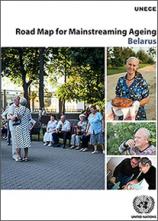
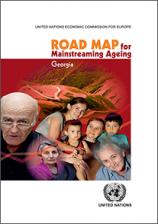
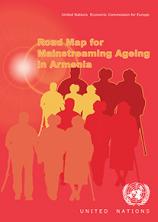
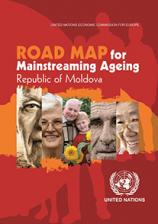
UNECE Policy Brief (2022)
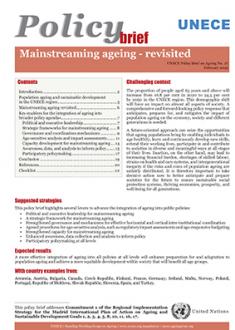
The population of the UNECE region is ageing: one in four people will be 65 years old or above by 2050 compared to one in six today. Population ageing has social and economic implications for which societies need to prepare. This requires a coordinated, whole-of-government and whole-of society effort to bring societies and economies into harmony with demographic change, otherwise known as "mainstreaming ageing". A more effective integration of ageing into all policies at all levels will enhance societal preparedness for population ageing and benefit all age groups. This Policy Brief highlights seven key "enablers" for mainstreaming ageing: political and executive leadership, strategic frameworks, governance and coordination mechanisms, age-sensitive analysis and impact assessments, capacity development, enhanced awareness, data and analysis to inform policies, and participatory policymaking.
Unofficial translation (GER)